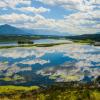
ALFAwetlands aims to map the EU wetlands and assess which wetland restoration measures will provide maximum climate and biological diversity benefits.
Wetlands have a remarkable capacity to sequester carbon, the estimated carbon storage of wetlands globally is 225 billion metric tons and they cover 5-8% of the world’s terrestrial landscape. However, wetlands are also source of greenhouse gases.
The ambitions of the EU to cut greenhouse gas (GHG) emissions by at least 55% by 2030 requires new GHG mitigation measures within all sectors including the land use and land use change (LULUCF) sector, where wetlands as an ecosystem rich in carbon (C) can contribute to both EU's climate targets and biodiversity strategy. However, currently a high uncertainty prevails of wetlands’ spatial and C sink extent, as well as source estimates and sustainable alternatives in restoration. This hinders the efficient use of wetlands in C mitigation and adaptation in the context of other LULUCF mitigation options.
Objectives and Activities
ALFAwetlands will advance the state of-the-art on the geospatial knowledge base on wetlands and their use and degradation in Europe. A co-creation approach will be applied to develop procedural knowledge and find ways for integrating multiple targets, supporting more inclusive, community-based approaches to wetland restoration.
Diverse novel experimental data on ecosystems’ responses to wetlands’ management and restoration regimes under different types of land-use and will be acquired and synthesised on biodiversity and other ecosystem services (BES). At the local level, Living Labs (LL) support and integrate interdisciplinary and multi-actor research on ecological, environmental, economic, and social issues. Models will be utilised to scale up experimental data from LLs, to gain an understanding of the potential impacts of upscaled wetland restoration options on BES provision, as well as changes in BES provision at the EU level for various policy-relevant time periods and the most policy-relevant CC mitigation and BD targets. The project will assess the societal impacts of wetland restoration, especially on BES benefits and costs of different restoration approaches and wellbeing impacts at local, national, and EU levels.
The main objective of the project is to map the wetlands sites and pathways, which are most urgent to restore and which restoration will provide maximum climate and biological diversity benefits. Here a focus will be on sustainable alternatives in restoration and take also into account possible after use of restored wetlands. ALFAwetland will predict the effects of the restoration measures in different climate scenarios (RCP2.6 – RCP8.5) and include socio-economic effects. IIASA will contribute an EU-scale assessment of the BES provision and socio-economic impacts / benefits for the upscaled wetland restoration measures and will quantify the potential of wetland restoration to mitigate climate change.
Project Partners:
Luonnonvarakesus (LUKE), Finland (Coordinator)
Michael Succow Stiftung zum Schutz der Natur (MSF), Germany
Stockhols Universitet (SU), Sweden
Tartu Ulikool (UTARTU),Estonia
Internationales Institut fuer Angewandte Systemanalyse (IIASA), Austria
European Wilderness Society, Verein zum Schutz der Europaischen Wildnis (EWS), Austria
Eigen Vermogen Van Het Instituut Voor Natuur - En Bosonderzoek (EV INBO), Belgium
Latvijas Valsts Mezzinatnes Instituts Silava (LSFRI SILAVA), Latvia
Ilmatieteen Laitos (FMI), Finland
Centro de Investigacion Ecologica y Aplicaciones Forestales (CREAF), Spain
Centre National de la Recherche Scientifique CNRS (CNRS), France
Universitat de Barcelona, Spain
Wetlands International - European Association (WI), Netherlands
Institut National de Recherche pour L'agriculture, L'alimentation et L'environment (INRAE), France
News

04 July 2024


